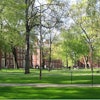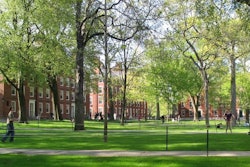
He uses the money for his living expenses — buying books and food and going out with friends on the weekends.
“I try to put some away, but it’s college,” Noll says. “Everyone here needs money, whether they come from better-off families and don’t have the money to live a life they’re used to, or don’t have money in general and are really just trying to live.”
In fact, much of the more than $1 billion a year in federal taxpayer-funded work-study money is going to the children of better-off families at expensive private universities, and not their lower-income counterparts, under a 50-year-old formula those pricey universities are unlikely to willingly relinquish.
The formula “disproportionately benefits the students who need it the least,” says Rory O’Sullivan, policy & research director at the youth advocacy organization Young Invincibles. “At a time of tight budgets, it doesn’t make sense. It should go to people who can benefit the most.”
Unlike other federal financial aid, the money for work-study isn’t allocated based on how many students at a university actually need it, but on how much the university got the year before, and how much it charges. That perpetuates a system under which universities that have been invested in work-study the longest, and have the highest tuition — largely, private nonprofits — are its biggest beneficiaries.
The result is that, today, nearly one in four work-study recipients comes from a family that earns more than $80,000 a year, a higher proportion than come from families that make less than $20,000, according to new figures from the U.S. Department of Education. Nearly half attend private, nonprofit universities and colleges. And fewer than half meet the federal definition of financial need.














